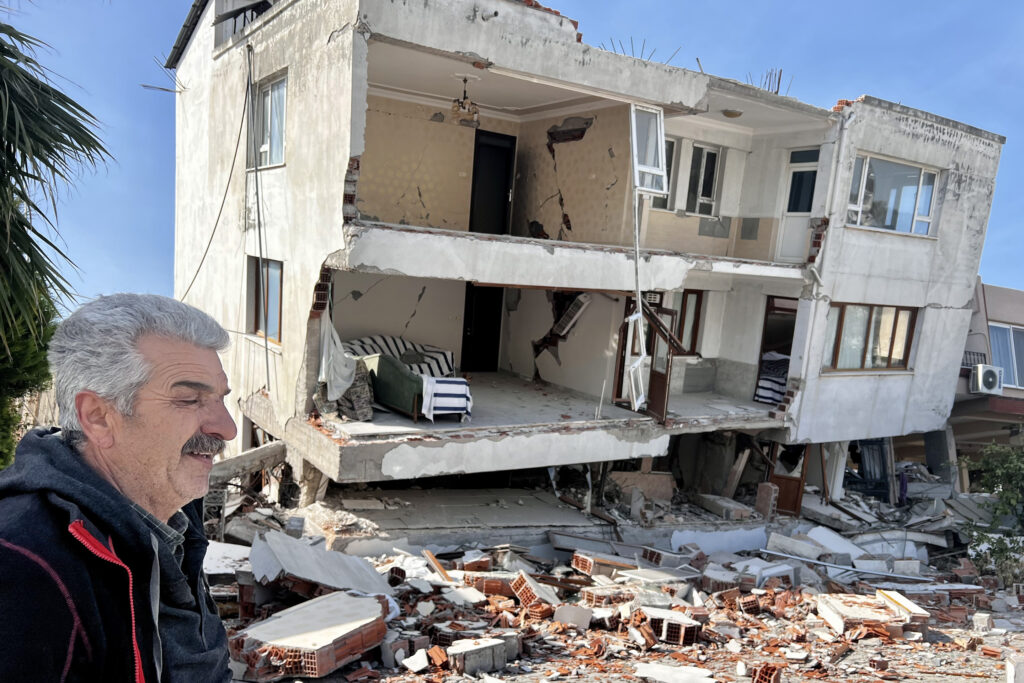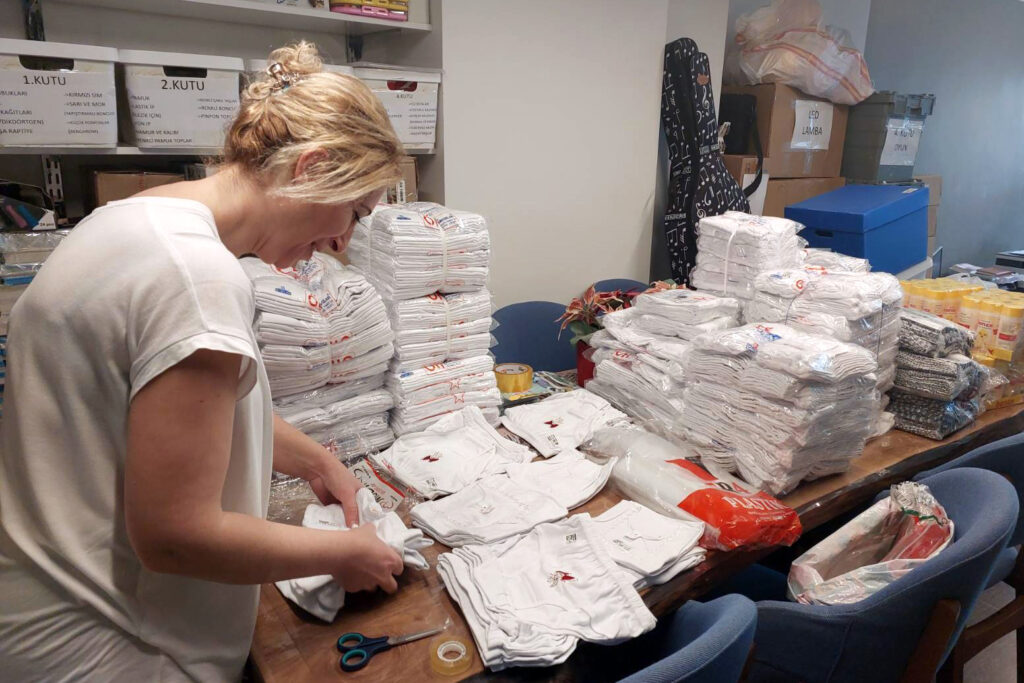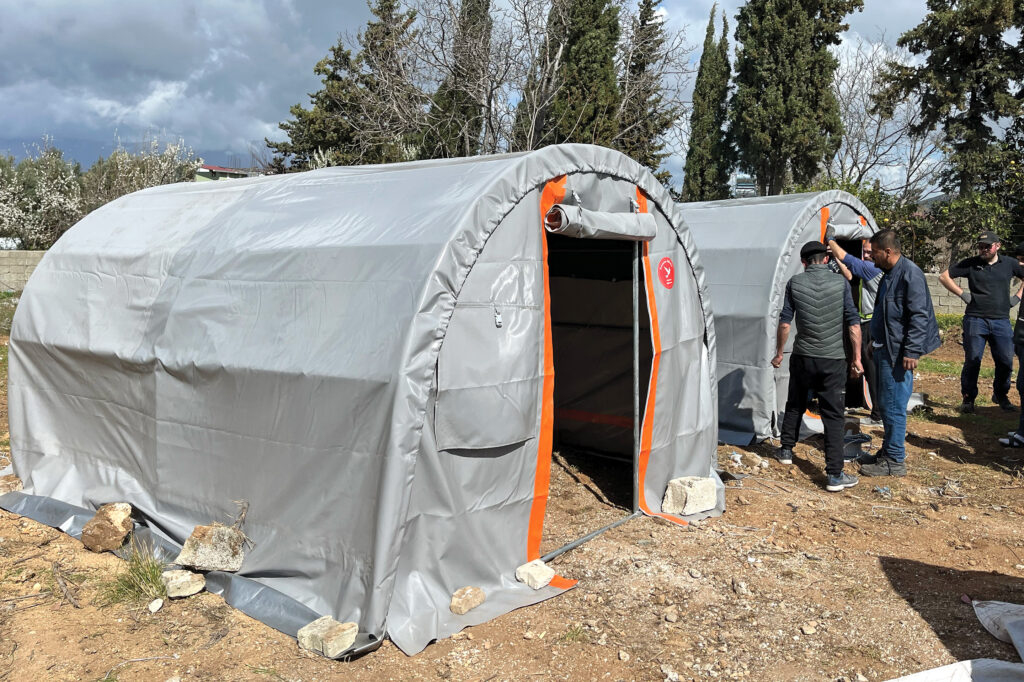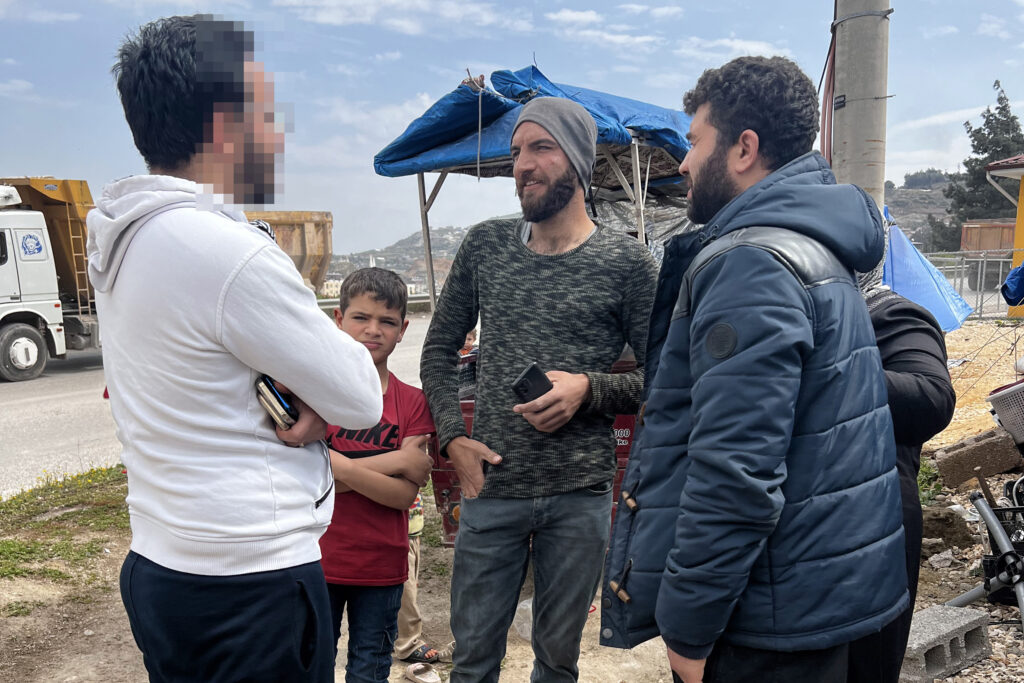“In one minute, it was all gone.”
Two Turkish brothers, gray-haired, mustachioed, and sorrowful, led their visitors toward the crumbling rubble of a house hurled upside down. They pointed to a crushed stairway, filled in with chunks of cement, fragments of tile coating the ground outside.
“The staircase collapsed as we were running out the door. The portico collapsed and just missed us, and we found ourselves out in the cold rain, watching our house crumble right next to us, and our businesses.”
The ruins of their life’s work extended down the street: a car dealership, a candy shop, a grocery store, all destroyed. Surveying the panorama of devastation, the men turned slowly, motioning to each flattened apartment building and relating the number of people they knew who had perished in each one. In their neighborhood outside of Antakya, very few buildings still stood.
Following the earthquake, the brothers, patriarchs of a family of 14, had lived with their family in a single tent pitched next to the rubble. They had met their visitors—a four-man team from Live Global—almost two weeks previously, when they had pulled into their street with sleeping bags and additional tents for the family. Although the brothers conveyed their need for shoes, handing over a paper scrap with each family member’s size painstakingly recorded, they were surprised when the team returned to fulfill their promise, carrying boxes of shoes and bags of food. The family shared glasses of tea with their guests, and when they proved willing to listen, they shared their grief.
Overwhelmed with loss, the brothers looked at them: “What do we do now?”

Shaken Foundations
When the magnitude 7.8 earthquake rocked southern Turkey and northern Syria in the predawn hours of February 6, 2023, many were left struggling to escape. Nine hours later, a magnitude 7.5 struck the same region, toppling already-damaged structures and increasing the loss of life.
Jonathan, an ABWE worker in the region, saw notifications of the quakes on his phone. “When we started hearing about the devastation, we weren’t getting the complete view of what happened,” he recalled.
The mountainous terrain, combined with fractured roads and unusually cold temperatures, freezing rain, and snow, delayed rescue efforts. The Turkish government later announced that 10 provinces experienced a state of emergency, and more than 50,000 people had been killed.
In a nation reported by the Joshua Project to be over 96 percent Muslim and 99 percent unreached, the spiritual implications are tragic.
Although few in Turkey today have opportunity to hear the gospel, the region was once a vibrant center of Christianity. The hard-hit city of Antakya, the site of New Testament Antioch and the place Christ-followers were first called Christians, was evangelized by Jewish believers displaced by persecution and Christians from Cyprus and Cyrene reaching the Gentile population. As “a great many people were added to the Lord” (Acts 11:24), its congregation, led by Barnabas and Paul, became a pillar in the early church and pioneers in spreading the gospel, commissioning the first missionary journeys.
This strong foundation was shaken, however, as the city was struck by disaster and invasions in the sixth century and later fell to the advancing force of Islam. The Christian population crumbled, only a remnant remaining in the modern Middle East.
But on February 6, churches throughout Turkey—despite their small size—immediately acted to aid their countrymen.
“As someone serving here, you feel kind of helpless, like what do you do, how do you help,” said Jonathan. “The reality of work in Turkey is that there are maybe 10,000 believers in the entire country of 85-plus million. . . . [B]ut in our congregation, everyone knew we had to do something. Churches came together—not just churches within the country, but believers worldwide helped, and are continuing to help.”
As an initial response, ABWE personnel channeled funds through the Middle East Compassion Fund to trusted Christian leaders in the affected area. These local pastors organized efforts to distribute hot meals, groceries, toiletries, diapers, and infant formula. When one reported that many had been forced to flee their homes in their pajamas and had no access to clean undergarments, the ABWE team supplied thousands of undergarments for men, women, and children.

From the beginning, the ABWE team prioritized partnering with churches on the ground able to provide long-term physical and spiritual care in their community. “We might have one chance of being light, being salt, and possibly having a gospel opportunity, but the churches that remain there are going to have a continued ability to do that,” explained Jonathan.
A Modern Tentmaking Ministry
One urgent need quickly surfaced: temporary shelters for residents who had lost their homes but needed to remain in their towns. As over 10,000 aftershocks added to their unstable situation, many became terrified of staying in an enclosed structure. The solution, a local church informed Jonathan, was to fabricate tents. With high costs and scarcity limiting options for pre-made tents, the church sent Jonathan a design to duplicate. He and the church he leads immediately got to work, following in the footsteps of the Apostle Paul as tentmakers.
Scouring the city for supplies, they found galvanized piping at a scrap yard and contracted a welder to fashion pieces for the frame.
“We were having to piece the tents together,” he recalled.
It took several days to perfect the design. Once they had a model, they took it to an industrial tailor who specialized in canvas coverings for vehicles. With the tailor, they designed a thick canvas cover that could withstand cold and wind and permit cooking inside with a wood stove. The result was a family-sized, 12-by-12-foot dwelling made for half the price and much stronger.

When they had finished 10 tents, they loaded them into a van with relief supplies and drove them to Antakya. Navigating through streets narrowed by rubble and crushed cars, they distributed the tents, primarily to families who had to stay close to livestock or crops. To connect their ministry to the local church, each tent had a sticker explaining that it had been donated through the Protestant churches.
“The Turkish mentality is that to be Turkish is to be Muslim,” Jonathan explained. “So for anyone to talk about a Turkish Christian, they literally say, ‘What? That’s impossible.’ So we’re showing them that this thing they didn’t think could exist does exist, and the people they think of as the enemy are showing them love.”
“They couldn’t believe that believers from across the world were being so generous and coming to help when so many other Muslim countries were not.”
–SARAH
Another ABWE couple, Gabriel and Sarah, traveled to a different location to set up a tent city organized by fellow believers. In the evenings, they sat with groups of women, listening to their stories and showing them love as they lamented together over cups of tea.
“We had a few conversations about our hope and beliefs and were able to pray for them,” noted Sarah. “They couldn’t believe that believers from across the world were being so generous and coming to help when so many other Muslim countries were not.”
The Voice of Jesus
One ABWE team serving with Live Global experienced the unique power of relationships to open doors for sharing the gospel. When the earthquake struck, Robin, a Live Global partner from North Africa serving Syrian refugees in Turkey, traveled down to Antakya to assist an international team of believers at a relief center.
“Robin has something none of the people at the center have, and that’s the ability to speak Arabic,” said Jeff, a Live Global director. In this region near the Turkish-Syrian border, Turkish citizens and Syrian refugees alike speak Arabic rather than Turkish, complicating relief work.
On Robin’s third trip to the area, he was joined by Jeff and two other men from the US. Equipped with rented vans and Robin’s ability to communicate, they delivered hygiene bags and food staples to contacts from the center and Robin’s previous visits. With each delivery, they were greeted warmly and invited to sit for tea or coffee according to the generosity of Turkish hospitality, even if their hosts were staying in tents or damaged buildings.
“People wanted fellowship and community. They wanted to debrief their story, or they wanted to forget it and enjoy making new friends and drinking tea,” explained Jeff. “Everyone had a story of loss. The man out for an early run, returning to find his whole family gone. The young surgeon who watched patients die when the earthquake cut off utilities. The elderly woman who lost 60 members of her family.”

Part of Robin’s strategy is to keep going back, showing Christ’s compassion, and building the relationships crucial to ministry in the Middle East. Many of the people they visited connected with Robin on social media, urging him to stay in touch. Drawing from experience in the region and the direction of the Holy Spirit, he looks for opportunities to start sharing the gospel in a culturally appropriate manner.
“We are likely to be the only Christians that these people may ever have a conversation with,” said Jeff.
The testimony of their love extended even to Turkish Muslims with whom they partnered to distribute aid. One young man volunteered in a warehouse loading trucks, even though he had lost his house and several family members. Touched by how many from around the world had come to help, he realized that he shouldn’t feel sorry for himself but join their efforts. When Jeff and Robin noticed he was working without sufficient clothing for the cold, they bought him a coat and shoes when they left the city to resupply. He responded with overwhelming delight at their care. As the volunteers shared the gospel with him as they worked, he pondered what he heard and saw enacted.
“I’m hearing Jesus’ voice . . . and I want to know more about him.”
–TURKISH VOLUNTEER
“I’m hearing Jesus’ voice,” he told Robin. “I’m hearing him speak to me, and I want to know more about him.”
Open Doors
The opportunities to minister through existing partnerships are growing. In Syria, where little international aid can enter due to 12 years of war and counting, Live Global partner Malik helped get funds to a Syrian pastor distributing food and ministering to traumatized children.
In both Turkey and Syria, ABWE workers and national partners have faithfully continued ministry in the spirit of the early church at Antioch, which itself sent aid to believers suffering from natural disaster (see Acts 11:28-29), serving the Lord today through crisis relief.
“It’s a daunting task for the tiny Turkish church, but even with a task so big, the church didn’t back down,” said Jonathan. “And a lot of doors have opened up for the churches.”
They continue to show Christ’s love by helping the hurting and speaking the gospel when hearts are ready, trusting God to rebuild his church in this spiritually dark region.
Jonathan added, “Being a testimony for Christ again in the first place that Christians were called Christians is a really special opportunity.”
Editor’s Note: Several names of ABWE personnel and Live Global national partners have been changed for security.
by: Katelyn Hawkins – Originally Posted at: https://abwe.org/blog/struck-down-but-not-destroyed/
